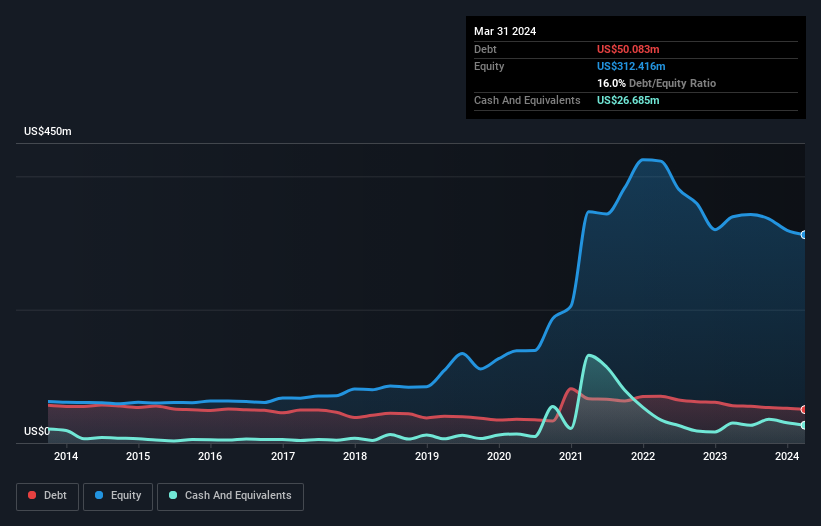- United States
- /
- Food
- /
- NasdaqCM:VFF
Would Village Farms International (NASDAQ:VFF) Be Better Off With Less Debt?

Warren Buffett famously said, 'Volatility is far from synonymous with risk.' So it seems the smart money knows that debt - which is usually involved in bankruptcies - is a very important factor, when you assess how risky a company is. We can see that Village Farms International, Inc. (NASDAQ:VFF) does use debt in its business. But the more important question is: how much risk is that debt creating?
When Is Debt A Problem?
Debt and other liabilities become risky for a business when it cannot easily fulfill those obligations, either with free cash flow or by raising capital at an attractive price. Ultimately, if the company can't fulfill its legal obligations to repay debt, shareholders could walk away with nothing. However, a more usual (but still expensive) situation is where a company must dilute shareholders at a cheap share price simply to get debt under control. By replacing dilution, though, debt can be an extremely good tool for businesses that need capital to invest in growth at high rates of return. The first step when considering a company's debt levels is to consider its cash and debt together.
View our latest analysis for Village Farms International
How Much Debt Does Village Farms International Carry?
As you can see below, Village Farms International had US$50.1m of debt at March 2024, down from US$56.0m a year prior. However, it does have US$26.7m in cash offsetting this, leading to net debt of about US$23.4m.

A Look At Village Farms International's Liabilities
We can see from the most recent balance sheet that Village Farms International had liabilities of US$72.7m falling due within a year, and liabilities of US$73.3m due beyond that. On the other hand, it had cash of US$26.7m and US$38.9m worth of receivables due within a year. So it has liabilities totalling US$80.4m more than its cash and near-term receivables, combined.
This is a mountain of leverage relative to its market capitalization of US$119.1m. This suggests shareholders would be heavily diluted if the company needed to shore up its balance sheet in a hurry. The balance sheet is clearly the area to focus on when you are analysing debt. But it is future earnings, more than anything, that will determine Village Farms International's ability to maintain a healthy balance sheet going forward. So if you're focused on the future you can check out this free report showing analyst profit forecasts.
In the last year Village Farms International wasn't profitable at an EBIT level, but managed to grow its revenue by 3.8%, to US$299m. That rate of growth is a bit slow for our taste, but it takes all types to make a world.
Caveat Emptor
Importantly, Village Farms International had an earnings before interest and tax (EBIT) loss over the last year. Indeed, it lost US$12m at the EBIT level. Considering that alongside the liabilities mentioned above does not give us much confidence that company should be using so much debt. Quite frankly we think the balance sheet is far from match-fit, although it could be improved with time. We would feel better if it turned its trailing twelve month loss of US$28m into a profit. So we do think this stock is quite risky. When analysing debt levels, the balance sheet is the obvious place to start. But ultimately, every company can contain risks that exist outside of the balance sheet. For example, we've discovered 2 warning signs for Village Farms International that you should be aware of before investing here.
When all is said and done, sometimes its easier to focus on companies that don't even need debt. Readers can access a list of growth stocks with zero net debt 100% free, right now.
New: Manage All Your Stock Portfolios in One Place
We've created the ultimate portfolio companion for stock investors, and it's free.
• Connect an unlimited number of Portfolios and see your total in one currency
• Be alerted to new Warning Signs or Risks via email or mobile
• Track the Fair Value of your stocks
Have feedback on this article? Concerned about the content? Get in touch with us directly. Alternatively, email editorial-team (at) simplywallst.com.
This article by Simply Wall St is general in nature. We provide commentary based on historical data and analyst forecasts only using an unbiased methodology and our articles are not intended to be financial advice. It does not constitute a recommendation to buy or sell any stock, and does not take account of your objectives, or your financial situation. We aim to bring you long-term focused analysis driven by fundamental data. Note that our analysis may not factor in the latest price-sensitive company announcements or qualitative material. Simply Wall St has no position in any stocks mentioned.
Have feedback on this article? Concerned about the content? Get in touch with us directly. Alternatively, email editorial-team@simplywallst.com
About NasdaqCM:VFF
Village Farms International
Produces, markets, and sells greenhouse-grown tomatoes, bell peppers, and cucumbers in North America.
Undervalued with excellent balance sheet.
Similar Companies
Market Insights
Community Narratives




